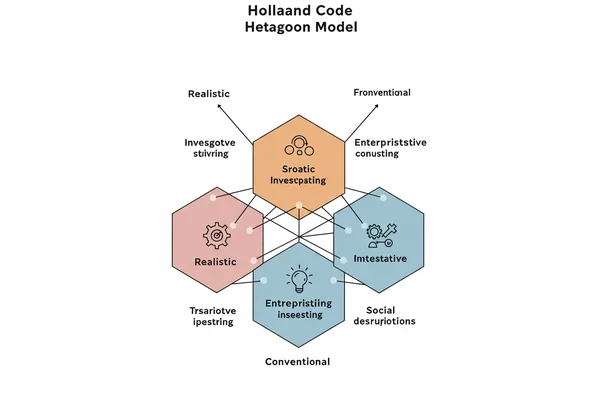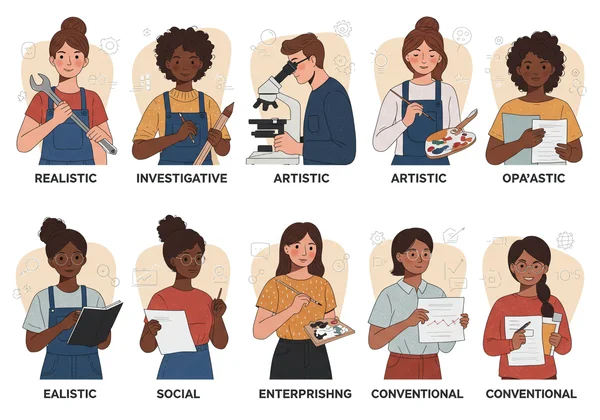Online Riasec Test for Career Clarity
July 21, 2025 | By Samuel Chen
Feeling adrift in a sea of career options? Whether you're a student choosing a major or a professional considering a change, the path forward can seem overwhelming. What if you could unlock your ideal career path just by understanding your core interests? That's where the scientifically-backed RIASEC model can help. By identifying your unique interests, you can find a career that feels less like work and more like a calling. This guide will walk you through the six RIASEC types, and you can discover your Holland Code with a quick, free test.

What are the RIASEC Personality Types & Holland Codes?
The RIASEC model is a renowned career interest theory developed by psychologist John L. Holland. It categorizes people based on their interests into six distinct types: Realistic, Investigative, Artistic, Social, Enterprising, and Conventional. Here's the simple but powerful idea: people are more likely to be satisfied and successful in jobs that match their interests. Your dominant types form a unique three-letter "Holland Code" (e.g., SAI, IRC), which acts as a compass for your career exploration. This code is what a career interest test aims to uncover.
The Origin of Holland's Theory of Career Choice
Dr. John Holland developed his theory in the 1950s, proposing that career choice is an expression of personality. He believed that if we can understand people's interests, we can predict the vocational settings they will thrive in. Holland's groundbreaking work transformed career counseling, shifting it from mere job matching to a more personalized and insightful process. The validity of Holland's theory has been supported by decades of research, making it a trusted tool for career advisors and individuals worldwide.
Decoding the Holland Code Hexagon Model
Holland arranged the six types on a hexagon to show their relationships. Types that are adjacent on the hexagon (like Realistic and Investigative) have more in common. Types that are opposite (like Realistic and Social) are the most different. Understanding this hexagon model is useful because it explains why you might have strong interests in several areas. Your Holland Code isn't just a label; it’s a map of your unique blend of interests.

Realistic (R): The Doers and Practical Problem Solvers
Realistic individuals are the hands-on "Doers" of the world. They enjoy working with tools, machines, plants, and animals. They prefer tangible results and often thrive in physical, outdoor, or mechanical settings. They are practical, stable, and find satisfaction in building, fixing, and creating concrete things.
Core Traits and Strengths of Realistic Individuals
- Practical and down-to-earth: They prefer dealing with real-world objects over abstract ideas.
- Mechanically inclined: They have a natural aptitude for understanding how things work.
- Physically active: They enjoy tasks that involve movement and hands-on engagement.
- Problem-solvers: They excel at finding practical solutions to tangible problems.
Ideal Work Environments & Common Realistic Careers
Realistic types thrive in environments that value practical skills and offer clear, physical tasks. They often prefer working outdoors or in workshops. Some top Realistic personality careers include:
- Mechanic
- Electrician
- Engineer
- Farmer
- Pilot
- Chef
- Forester
Investigative (I): The Thinkers and Analytical Minds
Investigative individuals are the "Thinkers." They are driven by a desire to understand the world around them. They enjoy working with ideas and theories, and they excel at research, analysis, and solving complex problems. They are intellectual, introspective, and prefer tasks that challenge them mentally.
Key Characteristics and Skills of Investigative Types
- Analytical and precise: They have a keen eye for detail and logic.
- Curious and intellectual: They love to learn and explore complex subjects.
- Independent and reserved: They often prefer working alone or in small, focused groups.
- Methodical: They approach problems systematically, using data and research.
Best Professions and Educational Paths for Investigative Personalities
The best Investigative personality jobs are in fields that require deep thinking, research, and expertise. They flourish in academic or scientific settings. Consider these paths:
- Scientist (Biologist, Chemist, Physicist)
- Medical Doctor
- Software Developer
- Market Research Analyst
- Psychologist
- University Professor
Curious if you are a "Thinker"? You can start your free test to find out.
Artistic (A): The Creators and Innovators
Artistic types are the "Creators." They are imaginative, intuitive, and thrive on self-expression. They enjoy working in unstructured environments where they can use their creativity and originality. They are drawn to the arts, music, writing, and design, valuing aesthetics and emotional expression over rules and conventions.
Traits and Values of Artistic Individuals
- Creative and imaginative: They see the world through a unique, expressive lens.
- Independent and non-conforming: They value freedom and dislike rigid structures.
- Emotional and intuitive: They are in touch with their feelings and use them in their work.
- Innovative: They love creating new things and bringing ideas to life.
Fitting Careers & Environments for Artistic People
Artistic individuals need freedom and a platform for their creativity. They are happiest in studios, theaters, and agencies. Top Artistic type careers include:
- Graphic Designer
- Writer or Author
- Musician
- Actor
- Photographer
- Architect
- Fashion Designer
Social (S): The Helpers and Communicators
Social individuals are the "Helpers." They are driven by a desire to assist, teach, and care for others. They are excellent communicators and thrive in collaborative environments. They are empathetic, patient, and find deep satisfaction in nurturing the growth and well-being of others.
Defining Qualities and Strengths of Social Personalities
- Empathetic and compassionate: They genuinely care about people and their problems.
- Cooperative and supportive: They are natural team players who build strong relationships.
- Excellent communicators: They are skilled at listening, explaining, and advising.
- Idealistic: They are motivated by a desire to make the world a better place.
Top Careers and Fields for Social Types
The best Social type jobs involve direct interaction with people in a helping capacity. Schools, hospitals, and non-profits are common workplaces. Consider these roles:
- Teacher
- Counselor or Therapist
- Nurse
- Social Worker
- Human Resources Manager
- Customer Service Representative
Enterprising (E): The Persuaders and Leaders
Enterprising individuals are the "Persuaders." They are ambitious, energetic, and enjoy leading, influencing, and persuading others. They are drawn to roles where they can make decisions, manage projects, and achieve organizational or financial goals. They are confident, assertive, and thrive in competitive, fast-paced environments.
Common Characteristics and Abilities of Enterprising Individuals
- Ambitious and goal-oriented: They are driven to achieve success and take on challenges.
- Persuasive and influential: They are skilled at sales, negotiation, and public speaking.
- Confident and assertive: They are natural leaders who aren't afraid to take charge.
- Energetic and outgoing: They enjoy interacting with people and managing teams.
High-Match Careers and Industries for Enterprising Types
An Enterprising careers list is filled with leadership and business-focused roles. They excel in corporate settings, sales, and entrepreneurship. High-match careers include:
- Sales Manager
- Entrepreneur
- Lawyer
- Real Estate Agent
- Politician
- Public Relations Specialist
See if you have what it takes to be a leader by taking the online riasec assessment.
Conventional (C): The Organizers and Detail-Oriented
Conventional individuals are the "Organizers." They are practical, orderly, and thrive on structure and precision. They enjoy working with data, following procedures, and ensuring everything is neat and accurate. They are reliable, efficient, and find satisfaction in creating order from chaos.
Traits and Preferences of Conventional People
- Organized and detail-oriented: They have a sharp eye for accuracy and enjoy structured tasks.
- Efficient and reliable: They follow rules and procedures to get the job done correctly.
- Practical and responsible: They prefer clear expectations and stable work environments.
- Conscientious: They take their responsibilities seriously and value precision.
Suitable Roles and Workplaces for Conventional Personalities
Jobs that fit Conventional personality traits are typically found in office environments, finance, and administration. They need clear hierarchies and predictable routines. Suitable roles include:
-
Accountant
-
Financial Analyst
-
Administrative Assistant
-
Data Analyst
-
Librarian
-
Web Developer (backend)

Your Next Step to Career Clarity: Putting Your Holland Code to Work
Understanding these six RIASEC types is the first step toward self-discovery. Each type offers a unique lens through which to view your interests and skills. But the real power comes from discovering your personal Holland Code—the unique combination of three types that best describes you. This code is your key to unlocking personalized career and education recommendations that align with who you are.
Ready to find your path? The journey to a richer, more fulfilling career starts with one simple step. Take our free RIASEC test now and get instant results to begin your exploration.

Frequently Asked Questions About RIASEC & Holland Codes
How is a Holland Code determined from the RIASEC Test?
Your Holland Code is determined by your answers to a series of questions about your likes and dislikes for various activities. The riasec assessment on our platform scores your interest level in each of the six RIASEC areas. Your code is composed of the three letters corresponding to your highest scores, ranked in order from highest to lowest.
Can my RIASEC type change over time?
While core interests tend to be relatively stable after your early 20s, they can evolve with new life experiences, education, and personal growth. It can be helpful to retake a career interest test every few years, especially if you are contemplating a significant career change, to ensure your path still aligns with your current interests.
Is the RIASEC test truly accurate for career planning?
How accurate is the RIASEC test? It's one of the most respected and well-researched career guidance tools available. It's not a crystal ball, but it's highly effective at identifying work environments and job families where you are most likely to feel engaged and satisfied. It provides a scientifically-backed starting point for meaningful career exploration.
How is the RIASEC test different from other personality tests like MBTI?
The main difference is focus. The RIASEC test measures your interests and matches them to career environments. Tests like the Myers-Briggs Type Indicator (MBTI) measure your personality preferences, such as how you process information and make decisions. Both are useful, but RIASEC is specifically designed for career guidance.
What if my interests fall into multiple RIASEC types?
That's completely normal! In fact, most people are a combination of two or three types, which is why the three-letter Holland Code is so effective. This blend of interests is what makes your career profile unique and opens up a wider range of potential jobs that require a diverse skill set. Find out your unique mix and get your results today.